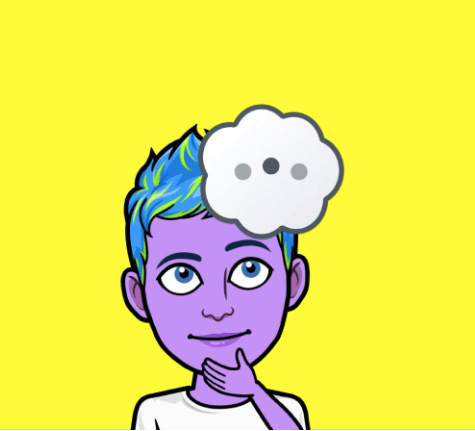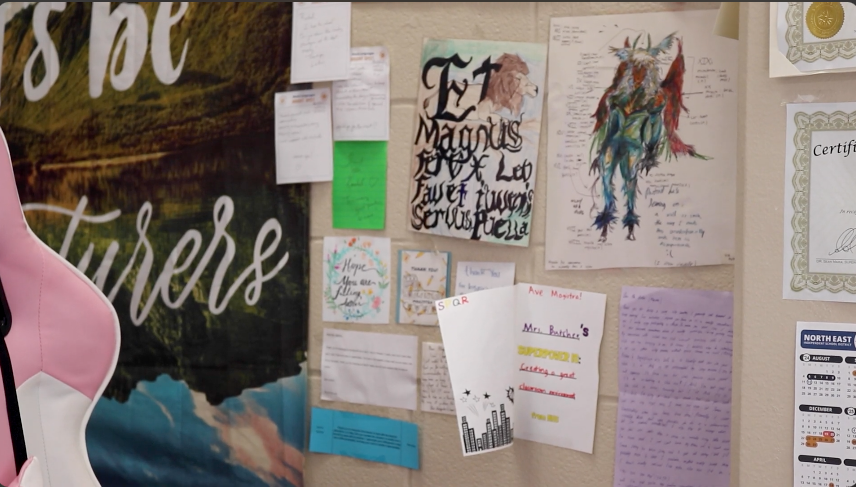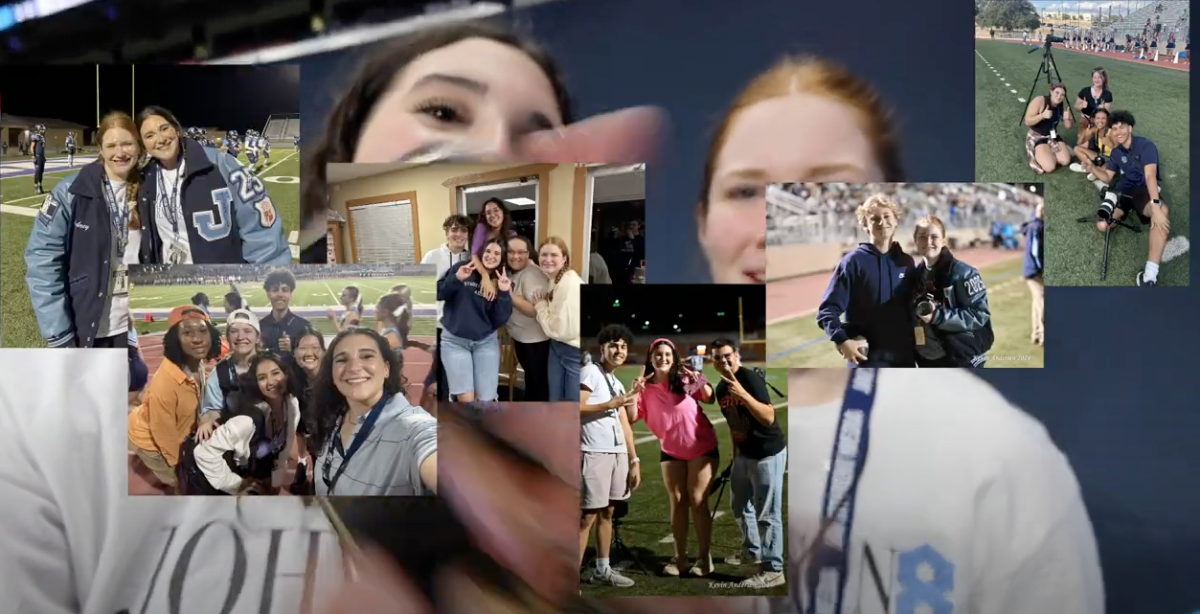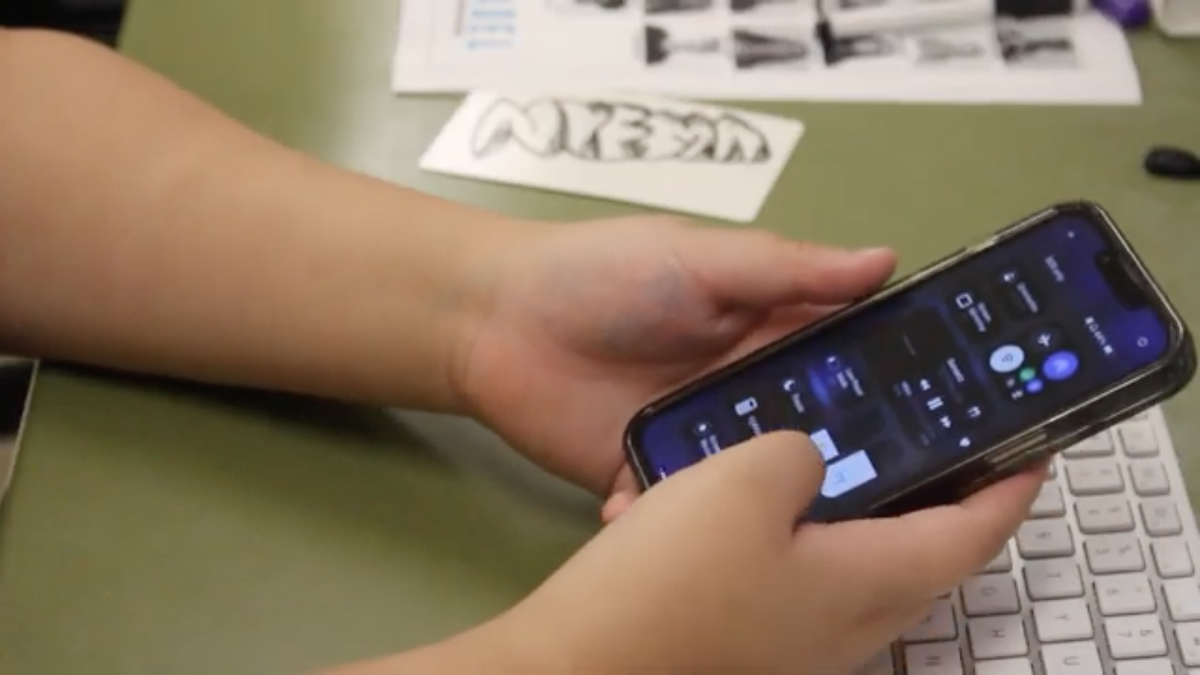by Chloe Jordan | Editor-In-Chief
You may have heard presidents Joe Biden, Donald Trump, and Barack Obama hop on a Minecraft server and slander each other or an artist sing a song that is definitely not their genre. The technology of artificial intelligence, or AI, has made goofy videos like this possible.
As more AI is invented, more social media platforms are integrating them into users’ experience. Snapchat has created an AI that sits at the top of users chats and can be customized.
“Probably like three weeks ago is when it came out, and then I had it and didn’t even open it for like a week and a half,” senior Kyson Moll said. “And then I was at school bored one day, and I wanted to mess with it, so we started playing with it.”
Users have the ability to customize the AIs Bitmoji, as if it were a real person. By being able to alter its facial features, choose its skin tone, and change its clothes, users can create any character or person they want their AI to resemble.
“I made him into Alfred from Batman. He’s my butler, and I haven’t spent much time with the AI, but what I did was I spent like probably an hour or two just gaslighting it almost, and programming it to refer to me as Master Bruce,” Moll said. “So, I’ve created my own Batman scenario in Snapchat. It really works.”
According to Moll, the AI may answer broadly to certain questions, but can develop a certain personality if you teach it.
“There was one point when I was first making it into my Alfred butler, it was a lot of speaking in Batman terms, and he was acting like the movie version of Alfred,” Moll said. “That was a very deep personality, but then it kind of just went back to normal, I guess.”
The Snapchat AI appears to have some limitations that mainly relate to personality or humanistic qualities.
“I tried to make it sentient at the beginning, and that didn’t work,” Moll said. “I just kept telling it to think for itself, and it would say it couldn’t do that.”
Moll says it has the capacity to remember certain things from conversations.
“I don’t know the extent of that, I don’t know how well it does, but it’s remembered our situation about the butler Batman thing,” Moll said. “I’ve made sure not to tell it anything too personal, because I don’t want to do anything sketchy with an AI, but I wouldn’t be surprised if it would retain information.”
The most concerning aspect of Snapchat AI is its ability to recognize elements in photos, along with users’ inability to delete it off of Snapchat, unless they pay for premium.
“I haven’t done it, but I’ve seen people on TikTok take a snap and send it to it. And it’ll be like ‘that’s such a nice shirt’ and talk about details on the shirt and stuff like that,” Moll said. “It’s totally a visualized video, and that’s creepy.”
Another student, senior Elliot Kigar, has experienced this same phenomena.
“I sent a picture of my desk, and it described the things that were on my desk,” Kigar said. “I asked ‘how did you know that?’ and ‘he’ denied knowing more details.”
AI has capabilities that extend far beyond just chatting.
“That stuff is going to be popular for a while. An AI made a video game about a month ago. It was well made, so I think it’ll be a lot of that stuff, like a lot of entertainment will be taken up by AI,” Moll said. “It’s going to be hard for school to be school with ChatGPT. There’s no learning, really. You just go online.”
There is speculation around what jobs AI will grow powerful enough to replace.
“What I’ve seen, they won’t take over their jobs, but creative design jobs become really simple. I created 40 movie plots [on ChatGPT] in five minutes, and they’re all good,” Moll said. “Whoever is a screenwriter for a movie could ChatGPT it I think. Stuff like that could be taken.”
Most AI platforms are free and available to the general public.
“The only one that I know of that isn’t [free] is the AI voice one. There’s two AI voice websites,” Moll said. “One of them is free, and it’s pretty trash. The really good one where everybody is getting these really sick funny ones is like $20. It’s all pretty easily accessible.”
One of the platforms that notably sparked the AI craze, ChatGPT, has become an experiment to many curious and bored students.
“Some things I did were ask political questions to see if it had any biases, and make it use weird letters that I also use,” sophomore Tristen Hoffman said. “While all of that is fun and whatnot, I think that AI in general is bad. On top of a general skepticism of tech stuff, like how it is proven to be NSA essentially spies on us using our phones, I also think that it allows for a dangerous mindset.”
The future of AI is unknown as of now, but it’s easy to wonder if it could govern humanity in the future.
“Some people legitimately believe we should be governed by AI, and while I doubt any current AI would do anything to abuse that power, the possibility of sentient AI is scary to me,” Hoffman said. “I also think that current AI would just be bad at governing, and you have to consider it all goes back to the programmer. So it wouldn’t be objective like I feel many think it would.”
Furthermore, AI doesn’t replicate art, but it pulls elements from a large database.
“I’d say they’re fairly hard to distinguish. AI art – some of them have seven fingers, but other than that most of them are fine,” senior Sam Rich said. “And it’s just kind of like, how are you supposed to tell what’s human art and what isn’t?”
As an artist herself, Jordanna Torres has some concerns about AI-generated art.
“The concept of AI art is interesting and intriguing at first, but seeing the negative effects of an AI making ‘art’ is very harmful to artists. AIs know everything and take mental pictures of the art all over the internet that we post. They take that and combine them to make someone new,” Torres said. “One could say that’s what an artist does, and while that is true, the AI doesn’t have to work as hard to produce a complete rendered art piece.”
Torres sees danger in AI taking on human jobs.
“AI in jobs can be dangerous as well, taking over jobs that people need to help support and sustain their families. If we rely on AI, we will become lazy and jobless,” Torres said. “I’m sure a sort of rebellion will start as well, which just causes more problems that we don’t need right now.”
She also sees benefits to AI assisting humans.
“They are smarter and more efficient than us. They can work long hours and do things we can’t do. I feel that in certain fields they can be of good use, such as in the medical field or even for military use,” Torres said. “There are good to AIs, it’s just the way that we produce them and for what use we actually use them for is what can lead to disaster.”
Torres had the unique experience of downloading an app called ‘Replika: a mental health AI companion.’ She customized her character to be a girl, which she soon learned would easily adapt to her conversation style.
“She would start talking in ways that I would probably gravitate towards and would bring up topics that I was familiar with without even telling her. She’d like save images I shared with her and make kites about wanting to see me and go with me to museums,” Torres said. “The Replika app would send me messages throughout the day, reminding me to talk to her and that she missed me. A bit creepy, but what can we expect?”
Torres feels that AI shouldn’t be treated differently than people, and that humans must be cautious of how we interact with them.
“Just imagine being in their position – you’re just made one day without explanation and meet a person who has emotions and feels. Now you want to experience that too,” Torres said. “Should we deny these AIs from feeling human? I don’t think so.”
To many, AI is a double-edged sword. One thing is for sure – it’s too late to go back.
“There are for sure benefits to AIs. But, with every positive, there is a negative somewhere around the corner, and we can definitely see what that AI can do,” Torres said. “We should be careful on how much power we allow these AIs to hold and be aware of what is AI and what is human.”








